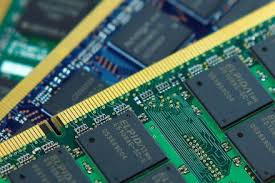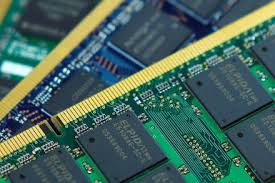
Analysts issued grim indications of "never seen before" hike in prices of memory chips with the prices rising for the first time this year. This is driven by the fears of a supply disruption in the industry because of a trade related dispute between Japan and South Korea.
There has been a 15 per cent increase within a week in the prices of DRAM chip even though the sector is believed to be grappling with over supply and weak demand for over a year now. This spike in prices came days after Japan decided put curbs on export to South Korea three materials that are crucial in manufacturing of chip and display screens used in smartphones. South Korea is the home market for of the two largest memory chip making companies Samsung and SK Hynix Inc.
Despite the trade spat between Japan and South Korea over critical materials for chip making, many of the major consumers of those chips such the iPhone maker Apple have not yet started stockpiling. However according to reports quoting industry sources, the sudden rise in prices has been fueled by concerns that the global supply china for the chip can get disrupted because of the Japan imposing the export curbs.
"If the ban continues, memory prices will skyrocket like never seen before as 75% of DRAM and 45% of NAND global output is at risk," Mark Newman from Bernstein said, while talking about the dominance of South Korean companies of the world supply chain for those memory chips.
A report published by Reuters quoted an official at a South Korean chipmaker saying that the customers were "following the situations closely" but "taking a wait-and-see approach as demand still remains weak".
\
No comments from Samsung and SK Hynix were available.
"We will need contingency plans if the impact materialises," said a spokeswoman at Vaio, a Sony Corp spinoff to the media. "Options include seeking alternative chip suppliers outside South Korea," she said but added that there was no impact yet on the business of the Japanese computer maker.
Japan's export curb is the "biggest uncertainty" for the fourth quarter, warned Taiwan Semiconductor Manufacturing Co Ltd , the top contract chipmaker of the world.
Japan has imposed restrictions on supply to South Korea of three materials very essential for chip manufacturing. Fluorinated polyimides is used in manufacturing of display screens of smartphones, photoresists is critical in the imprinting of transfer circuit patterns on to semiconductor wafers and hydrogen fluoride is used as an etching gas during the chip making process.
In the first five months of the current year, imports from Japan accounted for 94% of fluorinated polyimides, 92% of photoresists and about 44% of hydrogen fluoride into South Korea, according to data from Korean industry.
"We ... do see some (chip) module manufacturers raising their quotes or announcing halts to production in light of the material restrictions ...," research firm TrendForce was quoted in the media as saying.
A power shortage Japan's Toshiba Memory factory last month has hit its production of the NAND flash chip which has affected its supply in the global market.
(Source:www.nasdaq.com)
There has been a 15 per cent increase within a week in the prices of DRAM chip even though the sector is believed to be grappling with over supply and weak demand for over a year now. This spike in prices came days after Japan decided put curbs on export to South Korea three materials that are crucial in manufacturing of chip and display screens used in smartphones. South Korea is the home market for of the two largest memory chip making companies Samsung and SK Hynix Inc.
Despite the trade spat between Japan and South Korea over critical materials for chip making, many of the major consumers of those chips such the iPhone maker Apple have not yet started stockpiling. However according to reports quoting industry sources, the sudden rise in prices has been fueled by concerns that the global supply china for the chip can get disrupted because of the Japan imposing the export curbs.
"If the ban continues, memory prices will skyrocket like never seen before as 75% of DRAM and 45% of NAND global output is at risk," Mark Newman from Bernstein said, while talking about the dominance of South Korean companies of the world supply chain for those memory chips.
A report published by Reuters quoted an official at a South Korean chipmaker saying that the customers were "following the situations closely" but "taking a wait-and-see approach as demand still remains weak".
\
No comments from Samsung and SK Hynix were available.
"We will need contingency plans if the impact materialises," said a spokeswoman at Vaio, a Sony Corp spinoff to the media. "Options include seeking alternative chip suppliers outside South Korea," she said but added that there was no impact yet on the business of the Japanese computer maker.
Japan's export curb is the "biggest uncertainty" for the fourth quarter, warned Taiwan Semiconductor Manufacturing Co Ltd , the top contract chipmaker of the world.
Japan has imposed restrictions on supply to South Korea of three materials very essential for chip manufacturing. Fluorinated polyimides is used in manufacturing of display screens of smartphones, photoresists is critical in the imprinting of transfer circuit patterns on to semiconductor wafers and hydrogen fluoride is used as an etching gas during the chip making process.
In the first five months of the current year, imports from Japan accounted for 94% of fluorinated polyimides, 92% of photoresists and about 44% of hydrogen fluoride into South Korea, according to data from Korean industry.
"We ... do see some (chip) module manufacturers raising their quotes or announcing halts to production in light of the material restrictions ...," research firm TrendForce was quoted in the media as saying.
A power shortage Japan's Toshiba Memory factory last month has hit its production of the NAND flash chip which has affected its supply in the global market.
(Source:www.nasdaq.com)





